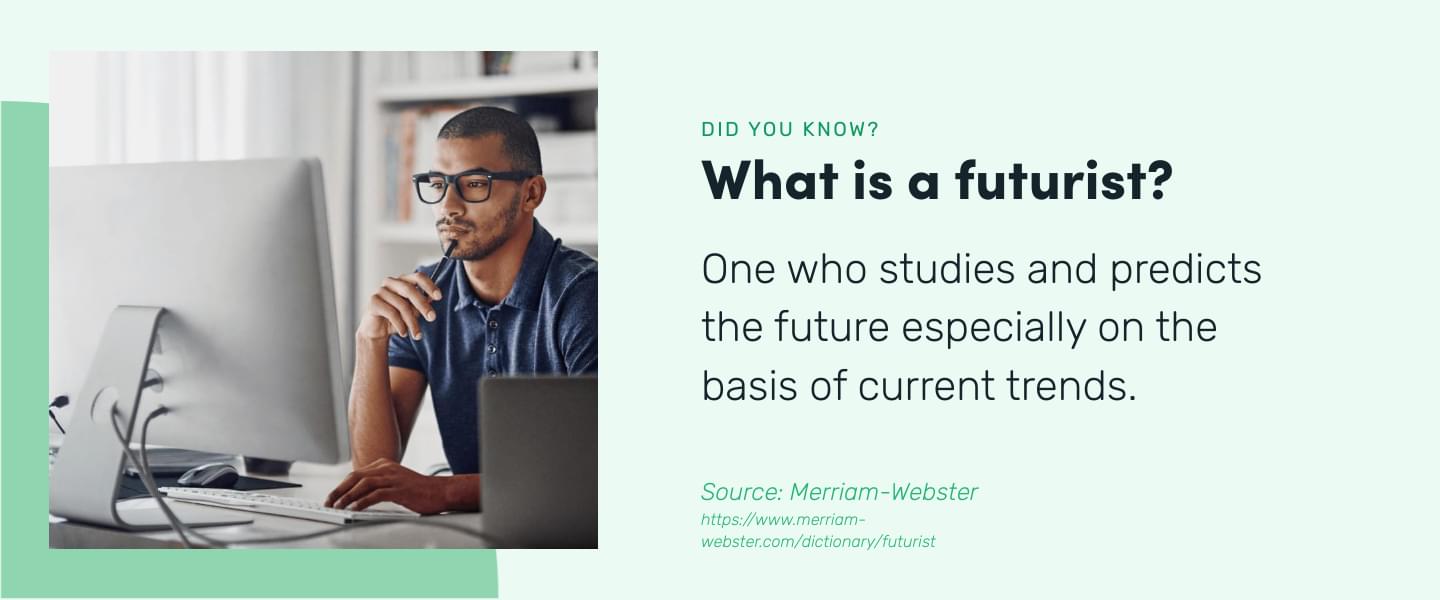Futurist.
Sounds like a pretty cool job title, doesn’t it? Before meeting Brian Solis, I had no idea it was a job title.
After chatting with Brian on the Ripple Effect podcast, I want everyone to know what a futurist is and does. Why? Because roles like his help push organizations forward. Without positions dedicated to innovation, processes stay the same, change is more difficult, and companies get stuck iterating versus innovating.

Listen Now: If you’re more of a listener than a reader, get access to Brian’s Ripple Effect episode Future of Work: Building a Mindset that Embraces Innovation now.
What is a futurist?
So what exactly does a futurist do? Here’s how Merriam-Webster defines a futurist: one who studies and predicts the future especially on the basis of current trends.

During his Future of Work podcast episode, Brian gave his own definition of what he does as a futurist. He explained it as scenario planning, saying it’s about “understanding data points and trends that could play out in a series of likely scenarios. You know, what if this, or what if that, and you plan for those scenarios so that you can devise business strategies.”
Why is this work important? According to Brian, it’s not simply about innovating or creating the next big thing; his work as a futurist helps others develop unique skill sets that empower them to do better work every day. “The exercise of going through that [scenario-planning] process helps you become more aware, empathetic, and mindful about all of the things that you don't normally think about. It helps you to be more prepared as a leader to essentially act outside of your own comfort zones and build the business that's going to be more resilient and hopefully more agile, lasting, and relevant.”
Related: Workplace Innovation Secrets with Stephanie Mehta
Why Innovation Matters
Brian is not only a futurist, but also the Global Innovation Evangelist at Salesforce. In this role, he explores how global digital trends impact market dynamics and identifies opportunities for growth and innovation.
Why does he focus so heavily on innovation? Because innovation is the key to building out a business. It allows organizations to identify what new behaviors are evolving and where there are opportunities to create net new business value.
Identifying gaps in your industry—brand new ways to offer services or products—and rethinking how things have always been done is one surefire way to make your organization stand out from the competition.
“Innovation is so important because it forces this exercise of understanding what are the trends happening in the world? What are the new technologies coming out? What can we do that's new?” Brian said. “That's going to change the game because the more you do that, the more you can be disruptive. Disruption is defined as doing new things that make old things obsolete. That's what makes innovation so important. In times of disruption, we see great invention where people are pushed or inspired or driven to develop that new thing.”
3 Ways to Become More Innovative
No matter your role or industry, finding innovative ways to get work done can benefit you. Whether you’re trying to solve a difficult workplace problem, vying for a promotion, or wanting to improve leadership skills, taking the time to innovate can help you make progress toward your goals.
But it can feel overwhelming to even think about trying to innovate. Maybe you don’t think you’re a very innovative person, or you’ve struggled to come up with fresh ideas in the past. Don’t worry, Brian insists it’s much easier than you think—it just takes a bit of practice and forming new habits.
Here are three actions Brian suggests you take to spur innovation and creative thinking.
Change Your Mindset
First and foremost, Brian wants everyone to understand that you don’t have to be a startup founder, rocket scientist, or genius in order to innovate. All you need to spark innovation is an open mind and some creativity.
“When we talk about something like innovation, we think it's for somebody else, or we look to bring experts in to help guide us,” he said. But Brian believes a simple change in mindset can unlock anyone’s creative thinking.
How do you create a mindset that embraces innovation? It requires:
- Believing in your creative abilities
- Making the space to focus
- Rewiring your brain to avoid bias
- Being open to all scenarios
- Challenging established systems
- Not fearing failure
Once you begin making time to think creatively, the ideas will flow. It will take practice to free yourself from the same old ideas, but the more you ideate, the better you will become.
Related: Is Design Thinking The Secret to Building Better Processes?
Break Processes
One interesting thing Brian points out is that businesses are built to execute but not innovate. We’re built to follow the same systems, processes, and plans day in and day out. But that hinders our ability to innovate. He goes on to say:
He makes it clear that innovation requires breaking rules and thinking outside the norm. When you’ve taken the time to reset your mind, it’s easier to step away from the way you’ve always done things. But you must be willing to go beyond the thinking and actually do it.
It’s important to not do this haphazardly; it requires in-depth planning, collaboration, and communication to pull off successfully. But if you put in the time to thoroughly map out your new idea, address the pros and cons, and create an action plan, people are much more likely to understand why change is necessary. Don’t be alarmed if there is pushback at first; it’s natural for others to protect the systems they trust and rely on, even if your new idea would greatly benefit them overall.
Learn More: Jumpstart Innovation by Listening to Your Customers
Be Introspective
One of the most surprising things Brian shared during his podcast interview was that innovation is tightly tied to introspection. He makes the argument that in order to create something new, you must be able to look inward and build on things like empathy, emotional intelligence, and mindfulness.
Doing this not only results in being a better innovator and thinker, but it improves your life overall. “That prelude to innovation is really about how do you change your routines to make time for creativity, introspection, and expression?” he said. “You'll find that not only in your work, but actually in every aspect of your life, you wind up being happier. The benefits aren't just innovation towards your organization, but also towards your life.”
Taking just a few minutes out of each day to be more mindful, analyze your inner drivers, and understand what enables your creativity makes it easier to bring fresh ideas to the surface. Developing a better understanding of your brain and the way you think will help you discover which strategies work best for stoking your creativity.

Unlock Your Genius
With just a bit of time, training, and intention, you can become a better innovator. Not only will you benefit from this professionally, but you’ll see it impact your overall happiness and wellness too.
Brian breaks down how any organization—regardless of size, industry, or notoriety—can harness innovation through a simple shift in mindset. In less than 30 minutes, he shares ways to not only unlock genius at the workplace, but within yourself as well.
Hear more excellent tips from Brian about how to unlock your genius by listening to his Ripple Effect episode Future of Work: Building a Mindset that Embraces Innovation now.











